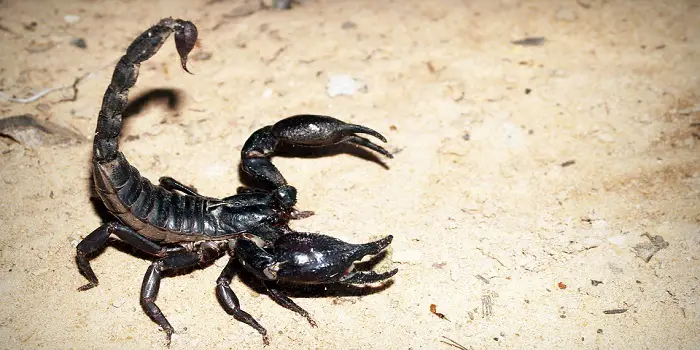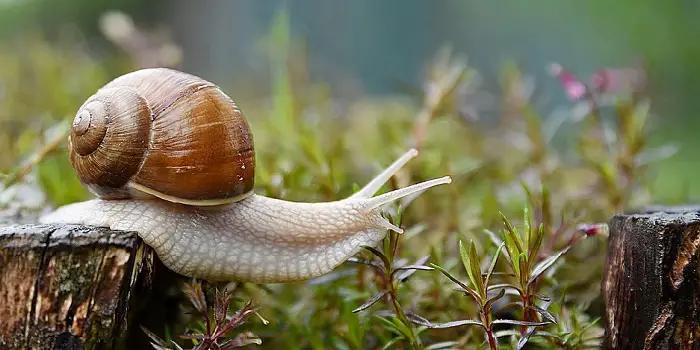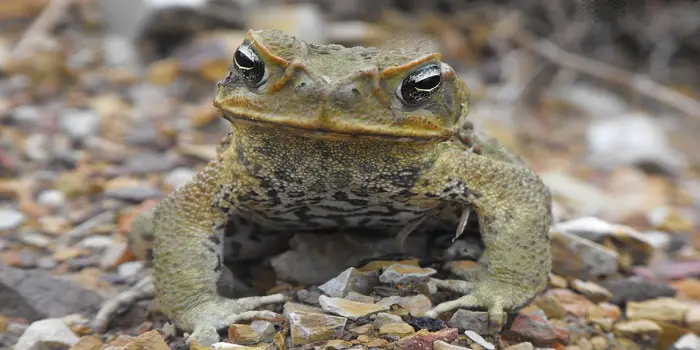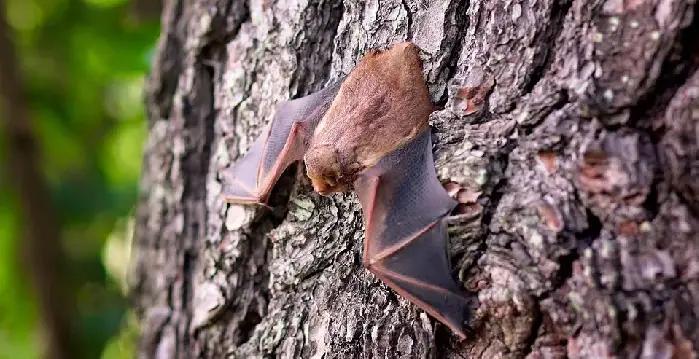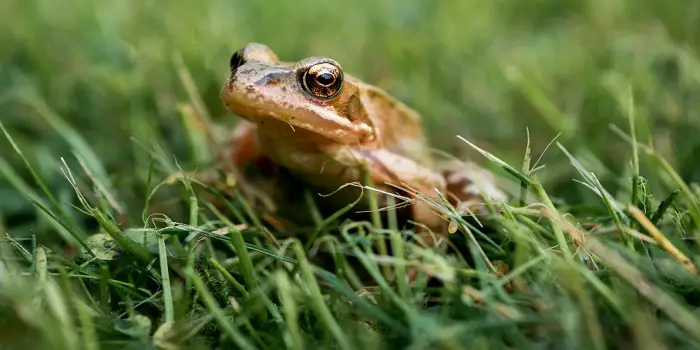
Eleutherodactylus coqui, commonly known as coqui frogs, are small in size, night predators which prey on insects as well as other invertebrates.
These frogs are known to come from Florida through a potted plant shipment in the year 1988.
One of the unique properties of these coqui frogs is the type of loud noise they make.
Puerto Rican Coquí is believed to be the loudest frog in the world that makes most noise.
The male frogs often make a unique mating noise, “Ko-Kee,” which is audible during the day as well as at night. This specific sound serves two purposes:
- KEE: Attract the females
- CO or KO: Repel the males to establish the territory
You won’t believe that they have an audibility of 90 decibels, the same as that of a moving lawnmower.
Consider the situation of how loud this noise can be if you have a large group of these frogs in your yard.
This is the major reason which makes removing them from your property essential if you happen to get them in your house or a back garden.
Why Remove Coqui Frogs?
Although native to Puerto Rico, the coqui frogs have already invaded vulnerable island habitats, including California and other major cities in the US.
The good thing being the infestation is found to be relatively small.
But still, steps are been taken to eradicate coqui frogs due to their destructive invasive nature.
Other than a loud noise, a few other reasons you should consider stopping coqui frogs from coming are:
a) Harmful to the environment
- They are a threat to native insects and spider breeds
- If coqui frogs get over-populated in an area, they can eat around 400,00 insects per night
b) Dangerous for the economy
- The devastating effect on tourism and fall in the sale of export plants
- Because of high pitch mating calls, a lot of noise pollution may occur that can negatively affect your property values
c) Disastrous effect on health and your living standards
- They may affect the will of people to stay or continue to live in affected locations
- The continuous mating calls during the day and night may ruin your sleep pattern completely
7 Ways to Get Rid of Coqui Frogs
The average lifespan of the common coquí is up to 6 years in the wild.
However, the majority of the adult frogs do not live past one year.
These can be a real nuisance for your family if they happen to get into your home and yard, particularly for those who are sensitive to loud noise.
Here are some effective steps you can follow to control coqui frogs in your backyard, swimming pool, or pond:
1- Lure traps
Coquis prefer moist and dark areas as their hideouts. So, to catch the Coqui frogs, you can use lure traps at some of these places.
Lure traps for catching Coqui frogs get success from the nesting behavior of the frogs.
These traps work to lower the population of the frogs by offering them a location for nesting.
It is also a great way to collect all the adults and eggs in one place.
If your area has a high frog density, then go for several lures at a time.
- Just link a ¾” diameter PVC pipe of 8-inches length to a T-connector
- Now put the trap at the height of 3 to 5 feet on the local plant. See the trap for at least two weeks.
- Then remove all the adults and eggs by putting them in a Ziploc bag and freeze them to kill or just release them at a distant location
2- Hand capture
Coqui frogs are usually visible at night on plants that are not more than 10ft. off the ground.
Once the sun goes down, just take a torch and check out between dead leaves, palm axils, and tree crotches.
You can find and catch some of them along with their eggs below the bark, or dead leaves.
- For capturing the Coqui frogs with your hand, make sure you wear a glove and carry a Ziploc bag along with you.
- If the frog has stopped making noise or is hidden, you can play its recorded call to attract and capture it. You are bound to find one or more females around a male coqui.
- After you have captured a frog, you can easily transport it to a local lake or stream, where it will find a new home.
- If the captured frog is large and difficult to handle, you can place it in the fridge (or freezer) for some time. This will make them fall asleep and will euthanize them, allowing you to transport them much easier.
3- Sprinkle citric acid
Citric acid is more commonly known to deter coqui in Hawaii.
So, if you want, you can sprinkle some citric acid on the infected plants to kill coqui- adults as well as their eggs.
As frogs use their skin for breathing, they cannot tolerate any chemical contact like citric acid.
For effective results, you can repeat the below-mentioned procedure every two weeks.
- Sprinkle foliage during nighttime when these frogs are highly active
- First, sprinkle on the ground and then gradually move upside
- Spray all over the vegetation where the frogs likely stay and perch
Remember, chemicals such as citric acid, baking soda, or hydrated lime solutions may be harmful to other plants in your garden, like orchids and ferns.
So, to prevent any damage, rinse these sprayed plants with fresh water to remove all the citric acid.
4- Remove the attractions
As mentioned before, food and shelter for the frog are what attract them to your property in the first place.
If you eliminate them, you will make your home and yard less attractive to coqui frogs.
Even if they come not to find any food and shelter, they will soon get away.
A few tips you may follow to make your place unattractive to them are:
- Eliminate the bugs, flies, and mosquitoes in your garden
- Cover or fence the pool along with other water features in the yard
- Remove standing water sources, clean the gutters and check for the poor drainage system
- Remove shade and shelter like excess weeds, fallen leaves, or tall grass where they can hide in
- Turn off the night lights in your outdoor/garden as it can attract a number of insects and hence frogs
- If you want lightning outdoors, you can instead use insect repelling light sources like citronella candles, torches, or yellow lights
5- Create a frog haven
Making a DIY frog haven (frog den or a house for them) in your garden is a good idea if you want to just keep them away from your house and not your yard.
This way, you can make sure that they do not get caught away in your lawnmower while mowing the garden and, at the same time, control the insect population.
The good thing that I like most about this method is it’s cheap to implement and does not harm/kill the frogs, which also makes it a legal method almost everywhere.
But remember, if noise is your primary concern, this method will not be very useful for you as it can still be very noisy for you day and night.
6- Herbicides & pesticides
One of the easiest, fastest, and most effective methods to get rid of a frog infestation is by using chemicals like weed killers and other pesticides in your garden.
You can use them to spray along walkways or to eliminate the frogs’ food source.
Without a good food source around, these frogs often do not come attracted or may leave your place very soon.
Plus, when you spray them nearby, it also acts as a deterrent for them.
Do remember that you do not use it to spray directly on these frog species to kill them.
This may be considered against the law as it reduces their overall population over time.
7- Try home remedies to deter frogs
Trying various home remedies for treating the yard and nearby pool areas can also help repel the frogs for good.
You can try one of these home remedies if you want:
- Sprinkle some coffee grounds in your garden, which will cause discomfort to the frogs if they step on them
- Spray a bit of saltwater on your walkways, ground, and other surfaces like driveways. This will sting the frog’s feet and cause discomfort.
- Make a solution using water and vinegar in equal amounts. Spray it as you did with salt water, and it will cause a similar effect to deter the frogs.
The only downside of using these methods for deterring golden coqui frogs is that they can be harmful to certain plants, particularly those sensitive to acidic soil.
Other unusual Frogs in the World You May Like to Know About
Largest tree frog: Giant tree frog
Largest and heaviest frog: Goliath frog
Longest sleeping frog: Striped burrowing frog
Most poisonous frog: Golden poison frog
Longest jumping frog: American bullfrog
Most musical frog: African reed frog
Worst-smelling frog: Aromobates Nocturnus
The frog that survives freezing: Wood frog
Ugliest looking frogs: Flaming poison frog, the red-eyed tree frog, the tiger frog
How to Keep Frogs Out of Your Pool?
If you have a swimming pool on your property, frogs can get attracted very soon.
Especially they love to hide in swampy areas near your pool (or backyard) when the pool is not in regular use.
The unused pool may have stagnant water, or even if it’s drained, there may be collected rainwater that makes the conditions for frogs pleasing.
Many times, frogs (and other small critters) may drown inside the pool, which can cause various health issues for you.
Its therefore important that you keep your pool protected and try ways by which frogs, insects, and other critters can stay away.
Some of these include:
- Keep your swimming pool covered and well drained when not in use
- install a circulation pump during the pool season to keep the water moving
- Use products such as Swimline FrogLog Escape ramp system that keeps the frogs from drowning inside the pool
I am already using FrogLog for my pool, and it works great.
It’s easy and fast to set up.
Plus, it provides a way for frogs and other rodents to escape from the pool, especially for the ones that are not good swimmers.
This way, it doesn’t make my pool unhygienic.
Other Related Questions:
Is the coqui frog poisonous?
Coqui frogs are not poisonous in nature.
Often confused with other invasive Caribbean species of frogs they vary in color, size, and markings.
Can you keep a coqui as a pet?
While many other species of frogs can be kept as a pet, it is illegal to keep Coqui as pets in Hawai, where they are usually found.
You are also not allowed to import, export, breed, or sell coqui frogs in many such places.
Can frogs come out of the toilet?
Frogs usually like moist areas where they can keep their skin moist – the pond in your backyard or your sewer.
To find a better place to shelter, they can even swim or climb up your toilet drain pipe.
The Conclusion
Frogs can be highly beneficial in controlling the insect population.
These natural bug controllers also do not harm the plants.
In fact, the droppings of frogs which are enriched with protein, can benefit the soil for growing certain plants.
But these critters can be a nuisance due to their loud noise, which can turn out to be unbearable for many.
One of the best options to keep Coqui at bay is to learn more about them.
Find out what harm they can cause to you and your home and how to confirm it’s them and not any other frog.
Although they have their natural predators like birds, snakes, and larger arthropods like spiders, seeking professional help will help you in controlling them with ease.
Since they have a variety of different humane approaches to deter them from entering your property, it can be the most effective solution if you have a large number of frogs in your yard.
Share the post "7 Easy Hacks to Catch and Get Rid of Noisy Coqui Frogs?"

Welcome to ProShieldPest.com. I am Tina Jones. I have been working as a pest removal professional in Winslow, Arizona lately. At present, I love to spend my time with my family as a retiree.
Here I share all my knowledge and experiences to help people understand better how they can stop pests at their homes without actually killing them. Hopefully, the information you will find here will help in safeguarding your home! You can check more about me here.

